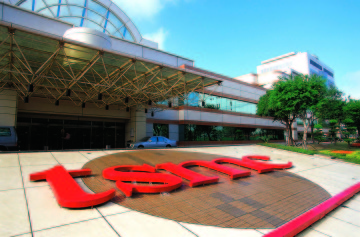 A British youth has been arrested over the hack that brought down the Playstation network and Xbox Live over the holiday period.
A British youth has been arrested over the hack that brought down the Playstation network and Xbox Live over the holiday period.
 A British youth has been arrested over the hack that brought down the Playstation network and Xbox Live over the holiday period.
A British youth has been arrested over the hack that brought down the Playstation network and Xbox Live over the holiday period.
 European antitrust watchdogs have serious doubts about Amazon’s cosy arrangement with Luxemburg to dodge its taxes.
European antitrust watchdogs have serious doubts about Amazon’s cosy arrangement with Luxemburg to dodge its taxes.
According to a report released today, the European Commission believes the Amazon deal constituted state aid and doubted that such aid was lawful.
The European Commission, which rules on competition and subsidies in the European Union, announced in October that it had opened an investigation into a tax ruling struck in 2003. It published details of its case on Friday.
The 23-page document, which was penned in October 7, concluded that Luxemburg gave Amazon an unfair advantage over European competition.
“The Commission’s preliminary view is that the tax ruling of 5 November 2003 by Luxemburg in favour of Amazon constitutes state aid… and the Commission has doubts at this stage as to that ruling’s compatibility with the internal market.”
 Swedish Pirate Party’s youth wing president hacked Sweden’s leading security and military experts as they searched for ‘holidays’ and ‘forest hikes’ during working hours.
Swedish Pirate Party’s youth wing president hacked Sweden’s leading security and military experts as they searched for ‘holidays’ and ‘forest hikes’ during working hours.
Gustav Nipe set up a Wi-Fi network called ‘Open Guest’ at a security conference earlier this week and several high profile officials used the network to log into their email accounts and surf the internet.
The Wi-Fi network was not encrypted which meant that Nipe could track which sites people visited as well as the emails and text messages of around 100 delegates, including politicians and journalists as well as security experts.
He said it was ironic that the security establishment was in Sälen pushing for more surveillance, but its leading figures go and log on to an unsecure W-Fi network.
Some people were looking at Skype, eBay and Blocket and stuff like that, or looking for holidays and where you could go and hike the forest. This was during the day when I suppose they were being paid to be at the conference working, Nipe said.
Nipe said that the stunt was to draw attention to the problem of network monitoring in Sweden, and says he will not be revealing which sites were visited by specific experts.
With insecure networks like these, you can end up getting access even to secure servers because people so often use the same passwords for different sites. So he could have got into the government’s server or used other information to track people in their everyday lives, he pointed out.
However, some think that Nipe’s stunt might have actually broken Sweden’s Personal Data Act.
Martin Brinnen, a lawyer at the Swedish Data Inspection Board told Dagens Nyheter that Nipe had acted without the “explicit consent” of the Wi-Fi network’s users, despite the fact that they had agreed to join an open network.
Nipe told The Local that all the data he had collected would be encrypted so that no-one else could access it and added that it would be erased after it had been analysed.
 Virgin Galactic’s Richard Branson announced plans to launch as many as 2,400 micro satellites in an effort to set up a constellation capable of bringing broadband communications to millions of people who do not have it.
Virgin Galactic’s Richard Branson announced plans to launch as many as 2,400 micro satellites in an effort to set up a constellation capable of bringing broadband communications to millions of people who do not have it.
Beardie said he plans to launch a low-earth-orbit satellite constellation of 648 satellites to get the project rolling. The internet will be available through a company called OneWeb.
OneWeb is backed by Qualcomm for this planned world-wide Internet service. OneWeb said it plans to work with local partners to provide access. OneWeb terminals act as small cells with the ability to provide access to the surrounding area via a WiFi, LTE, 3G or 2G connection using an operator partner’s licensed spectrum, or only LTE or WiFi on unlicensed spectrum.
Writing in his bog, Beardie said that Virgin is working to build a two-stage rocket, known as LauncherOne that would air-launch launch from the company’s existing WhiteKnightTwo aircraft at about 45,000 to 50,000ft.
WhiteKnightTwo was part of the Virgin Galactic’s space tourism venture which had a major setback in October when the spaceship it launched crashed killing one pilot and injuring the other. However, this one uses a different launcher technology.
LauncherOne will be built using advanced composite structures, and powered by a new family of LOX/RP-1 liquid rocket engines. Each LauncherOne mission will be capable of delivering as much as 225 kilograms (500 pounds) to a low inclination Low Earth Orbit or 120 kilograms (265 pounds) to a high-altitude Sun-Synchronous Orbit, for a price of less than $10M, Beardie wrote.
He said that this was a very efficient way of getting satellites into space. Virgin can take off every three or four hours.
The first batch of satellites will cost around $2 billion which will be very competitive on price, as far as the end-user is concerned.
“We believe that the break-even of this is not enormous. We feel it makes sense economically as well.”
 Google is ending sales of its Google Glass eyewear, but insists that it will launch the smart glasses as a consumer product one of these days.
Google is ending sales of its Google Glass eyewear, but insists that it will launch the smart glasses as a consumer product one of these days.
Google said that it will instead focus on “future versions of Glass” with work carried out by a different division to before.
But it means that the Explorer programme, which gave software developers the chance to buy Glass for $1,500 will close.
It had been expected that once developers wrote some code to run on Glass it would be followed reasonably quickly by a full consumer launch.
However that did not happen and some feared that it would be it would be left in one of Google’s Beta hells for a thousand years.
Now it seems that that the Glass team will also move out of the Google X division which engages in “blue sky” research, and become a separate undertaking, under its current manager Ivy Ross.
Ross and the Glass team will report to Tony Fadell, the chief executive of the home automation business Nest, acquired by Google a year ago.
Fadell told the BBC that the project had “broken ground and allowed us to learn what’s important to consumers and enterprises alike” and he was excited to be working with the team “to integrate those learnings into future products”.
Google says it is committed to working on the future of the product, but is not giving any timescale when we will see it or see through it. Intel had pledged to support Google Glass – Tesco launched a Google Glass app earlier this week.
Go figure….
 The UK and the US are using the massacres in Paris as a pretext for “increasing co-operation” on snooping on internet users.
The UK and the US are using the massacres in Paris as a pretext for “increasing co-operation” on snooping on internet users.
Prime Minister David “one is an ordinary bloke” Cameron said the two countries will set up “cyber cells” to share intelligence and conduct simulated attacks to test the defences of organisations such as banks.
Cameron is visiting Washington to tell them how to sort out their economy and security, and is due to have a second meeting with President Barack Obama today.
Cameron said that the two countries had hugely capable cyber defences and the expertise and that is why they should set up cyber cells on both sides of the Atlantic to share information, Cameron said.
The cooperation between Britain’s GCHQ eavesdropping agency and the US National Security Agency will include joint war games, with the UK providing the Games Workshop figures and the US providing the rules, the polyhedral dice and the joints.
The first exercise later this year to involve the Bank of England and commercial banks in both the City of London and Wall Street. It is not clear who will be exercising but if you ask any bankers we have seen to do a push up the body bag count will be high.
“This is a real signal it is time to step up the efforts and to do more,” said Cameron.
The British leader said he also planned to discuss with Obama how the two countries could work more closely with big Internet companies such as Facebook and Google to monitor communications between terror suspects. This is of course something that Facebook and Google want nothing to do with, so chances are he will be talking about bringing in laws to force them.
One thing Cameron has not answered is that if the UK and US have such wonderful cyber ability and resources, how did the Paris attacks actually happen? It seems that the more snooping powers that the UK and the US demand, the less effect it has on the goal of preventing terrorism.
Intel released its fourth quarter 2014 results yesterday afternoon with income jumping 39 percent on improved demand for personal computer and server system chips. The company allowed that it is expecting a somewhat flat first quarter for 2015 which led shares 1.9% lower in after-hours trading. The PC Client Group’s earnings improved by three percent while the Data Centre Group’s earnings improved by 25 percent. Overall revenue increased by six percent year-on-year and gross profit margin exceeded 65 percent.
Analysts polled by Thomson Reuters expected per-share earnings of 66 cents and revenue of $14.71 billion.
For the current first quarter, Intel projected revenue between $13.2 billion and $14.2 billion and gross margin of 60 percent, plus or minus a couple percentage points. Analysts, on average, were expecting revenue of $13.76 billion and gross margin of 61.2 percent, according to Reuters.
For the year, Intel projected revenue to rise by a mid-single digits percentage rate and achieve a gross margin of 62% of revenue, plus or minus a couple percentage points. Analysts, on average, were expecting revenue to rise 4% and gross margin of 63.4%, according to Reuters.
PC Client Group Improves
Intel’s integral attachment to the PC market greatly affected earnings as the PC market growth slowed and consumer market demand was satisfied with less costly tablets and high capacity smartphones. The uptick in PC demand last spring has had a positive effect on earnings and aided in the company’s turnaround effort to become “the” dominant supplier in the mobile market. With Intel’s 14 nm manufacturing muscle Brian Krzanich is now “loaded for ARM” vowing to place 40 million Intel chips into tablets now dominated by ARM Holdings PLC.
3D 256 Gb NAND-Flash Bundling?
No mention was made by Intel of its recently announced 3D 256 Gb NAND-Flash devices. Intel has what can only be called an obsession with its ability to control the memory side of the sales equation without owning any of the fixed assets to produce it.
Analysts have been wondering why Micron was not more upbeat on the announcement; it is, after all the controlling partner in Intel-Micron Flash Technologies, Inc. (IMFT). Sources indicate that Intel will most likely begin bundling Processors and Memory kits with Intel claiming the lion’s share of margin leaving Micron to its own pursuits with its share of output.
Last but Not Least
The Data Centre Group is rumoured to be the earnings darling of the coming quarters with sources indicating market moving announcements over the first half of 2015. Those announcements concern Intel’s SDN for Cloud Computing efforts…
 Insurers with a worldwide presence are set to spend over $100 billion this year on IT. That will gladden the hearts of vendors.
Insurers with a worldwide presence are set to spend over $100 billion this year on IT. That will gladden the hearts of vendors.
 International Business Machines (IBM) has commissioned a survey which predicts what cars will be like in 2025.
International Business Machines (IBM) has commissioned a survey which predicts what cars will be like in 2025.
 Software giant Google will introduce a modular mobile phone that it says will be affordable for the five billion people who don’t yet have a smartphone.
Software giant Google will introduce a modular mobile phone that it says will be affordable for the five billion people who don’t yet have a smartphone.
 There’s more research data on the tablet market out today and the latest report suggests gloom for 2015.
There’s more research data on the tablet market out today and the latest report suggests gloom for 2015.
 A group of scientists at the Vienna University of Technology, claim their invention will lead to the next generation of outdoor displays.
A group of scientists at the Vienna University of Technology, claim their invention will lead to the next generation of outdoor displays.
 British Telecom has been told off by the British regulator Ofcom which seemed to back complaints from smaller broadband provider TalkTalk that BT was abusing its dominant position in the way it priced the wholesale offering.
British Telecom has been told off by the British regulator Ofcom which seemed to back complaints from smaller broadband provider TalkTalk that BT was abusing its dominant position in the way it priced the wholesale offering.
Ofcom said it would set up safeguards to make sure BT maintains a sufficient margin between its wholesale and retail superfast broadband charges which would allow rival providers to profitably match its prices.
BT has built a fibre network that has driven the uptake of broadband services, both by consumers and by rivals who rent the lines on a wholesale basis.
TalkTalk had complained there was not enough of a gap between wholesale price and the rate at which BT sold the product to retail customers, squeezing margins for competitors.
Under the new proposal BT would be allowed to set its wholesale fibre prices, but they must do it in such a way that others can compete profitably for superfast broadband customers.
“Ofcom’s indicative assessment is that BT is maintaining a sufficient margin under the new draft rules,” Ofcom said. “Therefore, the condition is a safeguard which limits BT’s ability to reduce retail margins in future, and ensures that any increases in BT’s costs must be reflected in its prices.”
 TSMC has reported record quarterly net profit and revenue thanks to strong sales of smartphones from its clients.
TSMC has reported record quarterly net profit and revenue thanks to strong sales of smartphones from its clients.
TSMC earned about $3 billion in net profit in October-December which doubles the results posted at the same time last year and slightly more than the last quarter.
Demand for increasingly feature-rich gadgets has led to a burst in growth for companies such as TSMC and local peer United Microelectronics, whose chips power features from fingerprint sensors to fourth-generation (4G) LTE receivers.
In the fourth quarter, TSMC’s profit margin decreased to 35.9 percent from 40.4 percent in the third quarter in October-December revenue.
However, things are not looking that good for TSMC’s future. Analysts are divided about whether Apple will select TSMC to produce chips for its next-generation smartphones. There are questions as to whether it can create the next generation chips Apple wants .
Samsung, which is TSMC’s main competitor for Apple custom, has previously said it is seeing increased demand for chips made with 14 nanometre technology, the likes of which could power the successor to the iPhone 6.
Now that the war between Apple and Samsung is cooling, it appears that Jobs’ Mob might return to its old chipmaker ally and leave TSMC high and dry.
 The ironically named CIA Accountability Board has cleared the agency of wrongdoing after the spooks searched the files of congressional investigators who were investigating the possible use of torture tactics during the Bush years.
The ironically named CIA Accountability Board has cleared the agency of wrongdoing after the spooks searched the files of congressional investigators who were investigating the possible use of torture tactics during the Bush years.
The board, set up by the CIA itself, published a report that said that five agency officials made a “mistake” by searching for files used by the Senate Intelligence Committee investigating the CIA, but said that their actions “did not reflect malfeasance, bad faith, or the intention to gain improper access to Senate Select Committee on Intelligence confidential, deliberative material”.
So, that is alright then, Americans can go back to bed knowing that its spooks are not really spying on their elected representatives.
However the accountability board said such a mistake was possible because there were no clear rules for using the “unprecedented” RDINet, the secure network set up to allow congressional investigators to review the CIA’s files on rendition, detention, and interrogation techniques.
The five individuals had “acted reasonably to investigate a potential security breach.”
Needless to say this inquiry overturns the conclusions of the current inspector general of the CIA, David Buckley, who said in a report last July that the five CIA officials had acted improperly by accessing the network. Buckley also found at the time that the CIA had inaccurately filed criminal referrals against congressional investigators that accused them of mishandling classified information.
Intelligence Committee investigators were presented with a message — “your use of this system may be monitored and you have no expectation of privacy” — every time they logged on. While the accountability board rejected that the agency had deliberately attempted to access confidential material, it alleged that Intelligence Committee investigators had accessed restricted CIA documents, violating an agreement about the use of RDINet.
Senators are furious with the results of the review and wanted to make sure that the CIA would stop stonewalling investigations and retaliating by snooping on investigating Senators.
Senator Dianne Feinstein, the ex-chairperson of the SSCI, also voiced her reaction in a statement in which she said she was “disappointed that no one at the CIA will be held accountable.”
Feinstein accused the CIA of improperly accessing Senate computers in 2010, a year after investigators began looking into whether the CIA’s “enhanced interrogation” methods constituted torture. CIA officials had snooped on the Intelligence Committee to discover what it knew about the agency’s interrogation methods, and that officials then began to remove almost 900 documents from the secure network that could implicate the agency in torture.